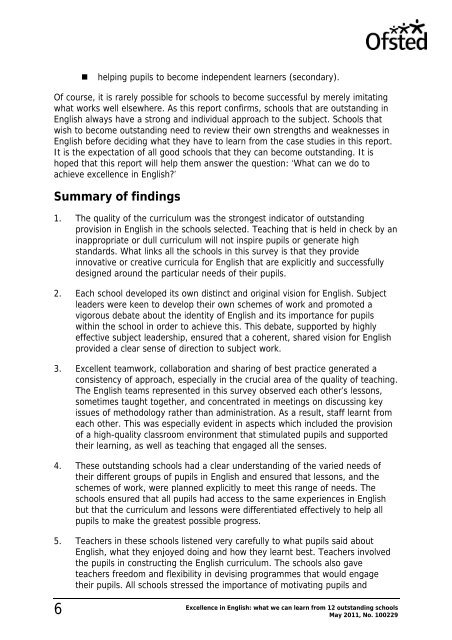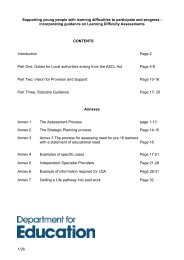Free download of:Excellence in English - Department for Education
Free download of:Excellence in English - Department for Education
Free download of:Excellence in English - Department for Education
Create successful ePaper yourself
Turn your PDF publications into a flip-book with our unique Google optimized e-Paper software.
6<br />
help<strong>in</strong>g pupils to become <strong>in</strong>dependent learners (secondary).<br />
Of course, it is rarely possible <strong>for</strong> schools to become successful by merely imitat<strong>in</strong>g<br />
what works well elsewhere. As this report confirms, schools that are outstand<strong>in</strong>g <strong>in</strong><br />
<strong>English</strong> always have a strong and <strong>in</strong>dividual approach to the subject. Schools that<br />
wish to become outstand<strong>in</strong>g need to review their own strengths and weaknesses <strong>in</strong><br />
<strong>English</strong> be<strong>for</strong>e decid<strong>in</strong>g what they have to learn from the case studies <strong>in</strong> this report.<br />
It is the expectation <strong>of</strong> all good schools that they can become outstand<strong>in</strong>g. It is<br />
hoped that this report will help them answer the question: ‘What can we do to<br />
achieve excellence <strong>in</strong> <strong>English</strong>?’<br />
Summary <strong>of</strong> f<strong>in</strong>d<strong>in</strong>gs<br />
1. The quality <strong>of</strong> the curriculum was the strongest <strong>in</strong>dicator <strong>of</strong> outstand<strong>in</strong>g<br />
provision <strong>in</strong> <strong>English</strong> <strong>in</strong> the schools selected. Teach<strong>in</strong>g that is held <strong>in</strong> check by an<br />
<strong>in</strong>appropriate or dull curriculum will not <strong>in</strong>spire pupils or generate high<br />
standards. What l<strong>in</strong>ks all the schools <strong>in</strong> this survey is that they provide<br />
<strong>in</strong>novative or creative curricula <strong>for</strong> <strong>English</strong> that are explicitly and successfully<br />
designed around the particular needs <strong>of</strong> their pupils.<br />
2. Each school developed its own dist<strong>in</strong>ct and orig<strong>in</strong>al vision <strong>for</strong> <strong>English</strong>. Subject<br />
leaders were keen to develop their own schemes <strong>of</strong> work and promoted a<br />
vigorous debate about the identity <strong>of</strong> <strong>English</strong> and its importance <strong>for</strong> pupils<br />
with<strong>in</strong> the school <strong>in</strong> order to achieve this. This debate, supported by highly<br />
effective subject leadership, ensured that a coherent, shared vision <strong>for</strong> <strong>English</strong><br />
provided a clear sense <strong>of</strong> direction to subject work.<br />
3. Excellent teamwork, collaboration and shar<strong>in</strong>g <strong>of</strong> best practice generated a<br />
consistency <strong>of</strong> approach, especially <strong>in</strong> the crucial area <strong>of</strong> the quality <strong>of</strong> teach<strong>in</strong>g.<br />
The <strong>English</strong> teams represented <strong>in</strong> this survey observed each other’s lessons,<br />
sometimes taught together, and concentrated <strong>in</strong> meet<strong>in</strong>gs on discuss<strong>in</strong>g key<br />
issues <strong>of</strong> methodology rather than adm<strong>in</strong>istration. As a result, staff learnt from<br />
each other. This was especially evident <strong>in</strong> aspects which <strong>in</strong>cluded the provision<br />
<strong>of</strong> a high-quality classroom environment that stimulated pupils and supported<br />
their learn<strong>in</strong>g, as well as teach<strong>in</strong>g that engaged all the senses.<br />
4. These outstand<strong>in</strong>g schools had a clear understand<strong>in</strong>g <strong>of</strong> the varied needs <strong>of</strong><br />
their different groups <strong>of</strong> pupils <strong>in</strong> <strong>English</strong> and ensured that lessons, and the<br />
schemes <strong>of</strong> work, were planned explicitly to meet this range <strong>of</strong> needs. The<br />
schools ensured that all pupils had access to the same experiences <strong>in</strong> <strong>English</strong><br />
but that the curriculum and lessons were differentiated effectively to help all<br />
pupils to make the greatest possible progress.<br />
5. Teachers <strong>in</strong> these schools listened very carefully to what pupils said about<br />
<strong>English</strong>, what they enjoyed do<strong>in</strong>g and how they learnt best. Teachers <strong>in</strong>volved<br />
the pupils <strong>in</strong> construct<strong>in</strong>g the <strong>English</strong> curriculum. The schools also gave<br />
teachers freedom and flexibility <strong>in</strong> devis<strong>in</strong>g programmes that would engage<br />
their pupils. All schools stressed the importance <strong>of</strong> motivat<strong>in</strong>g pupils and<br />
<strong>Excellence</strong> <strong>in</strong> <strong>English</strong>: what we can learn from 12 outstand<strong>in</strong>g schools<br />
May 2011, No. 100229
















